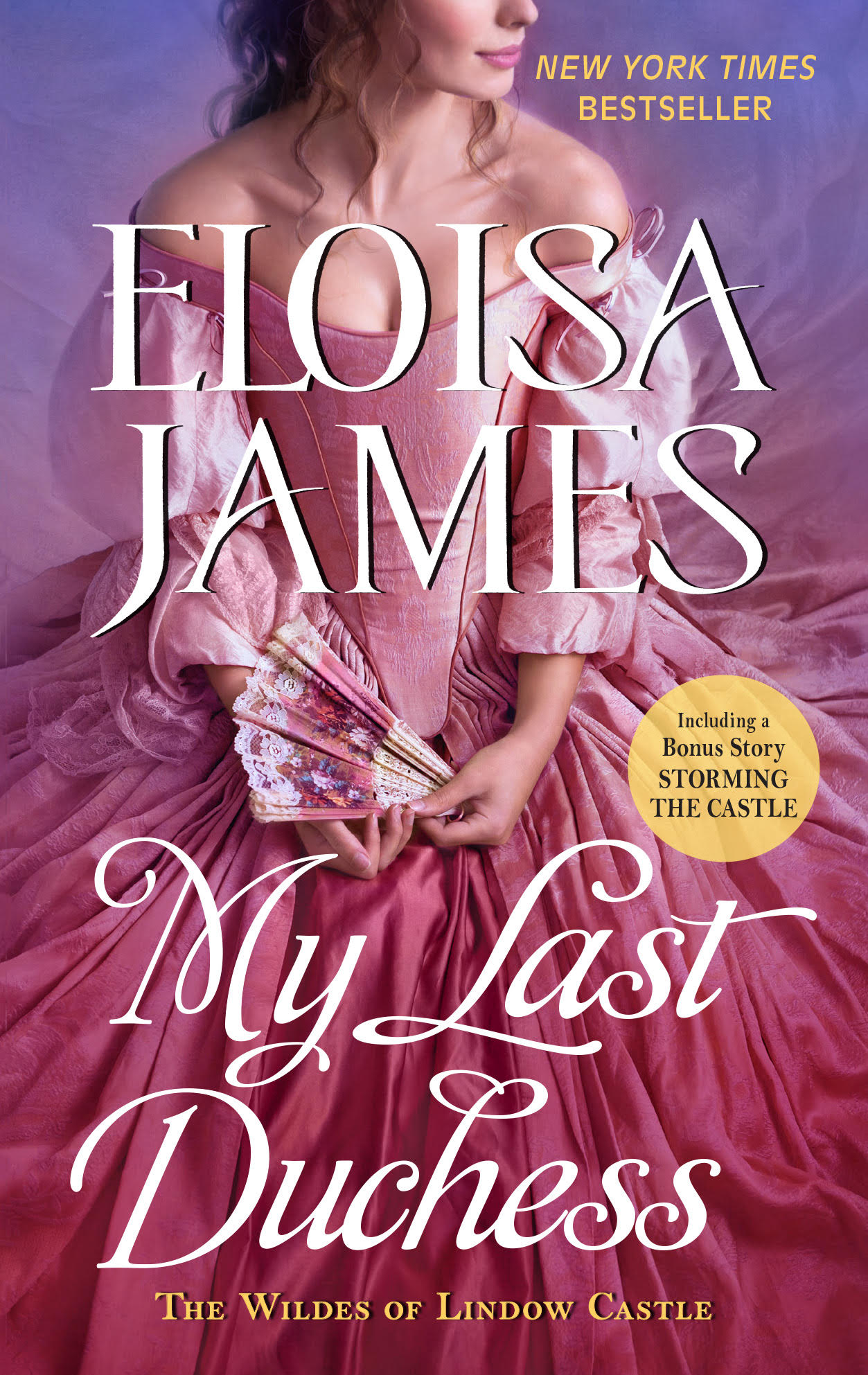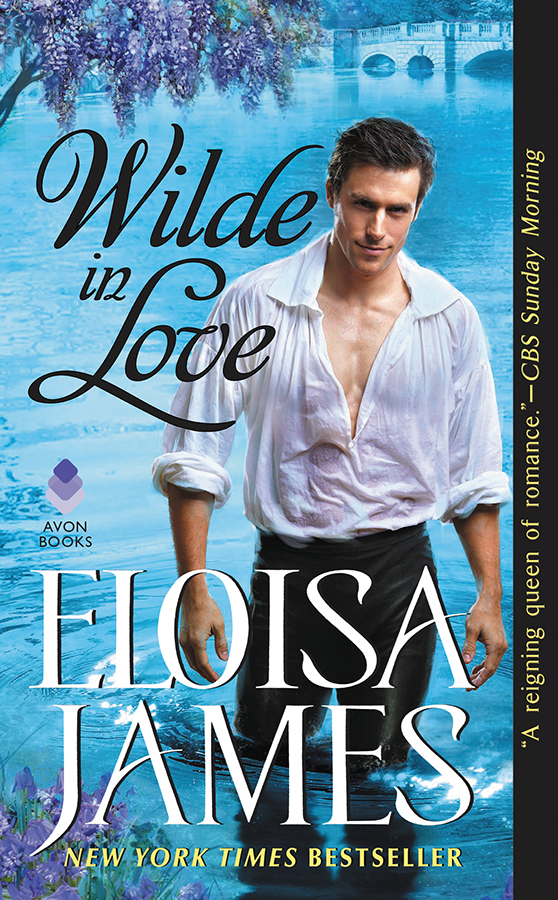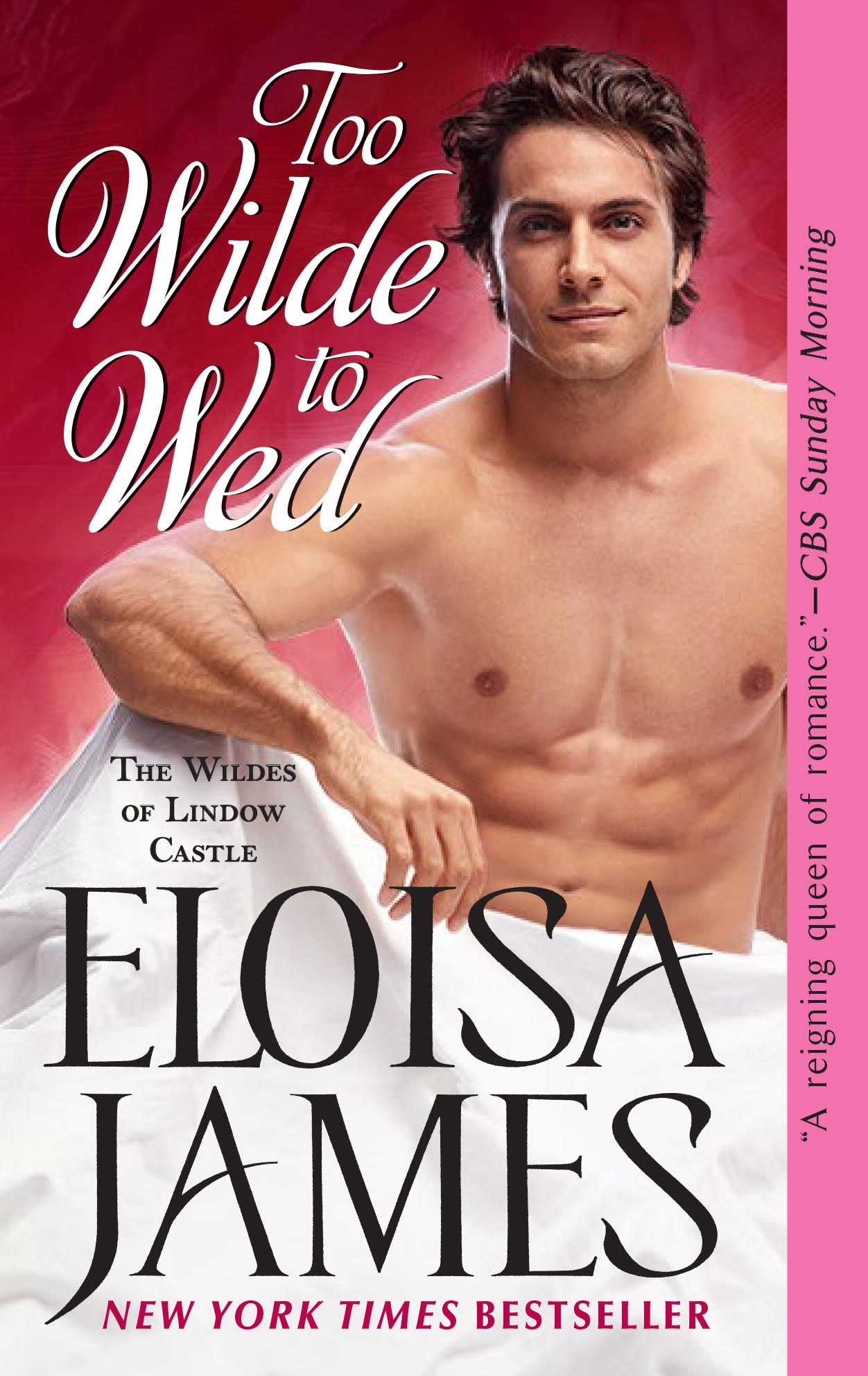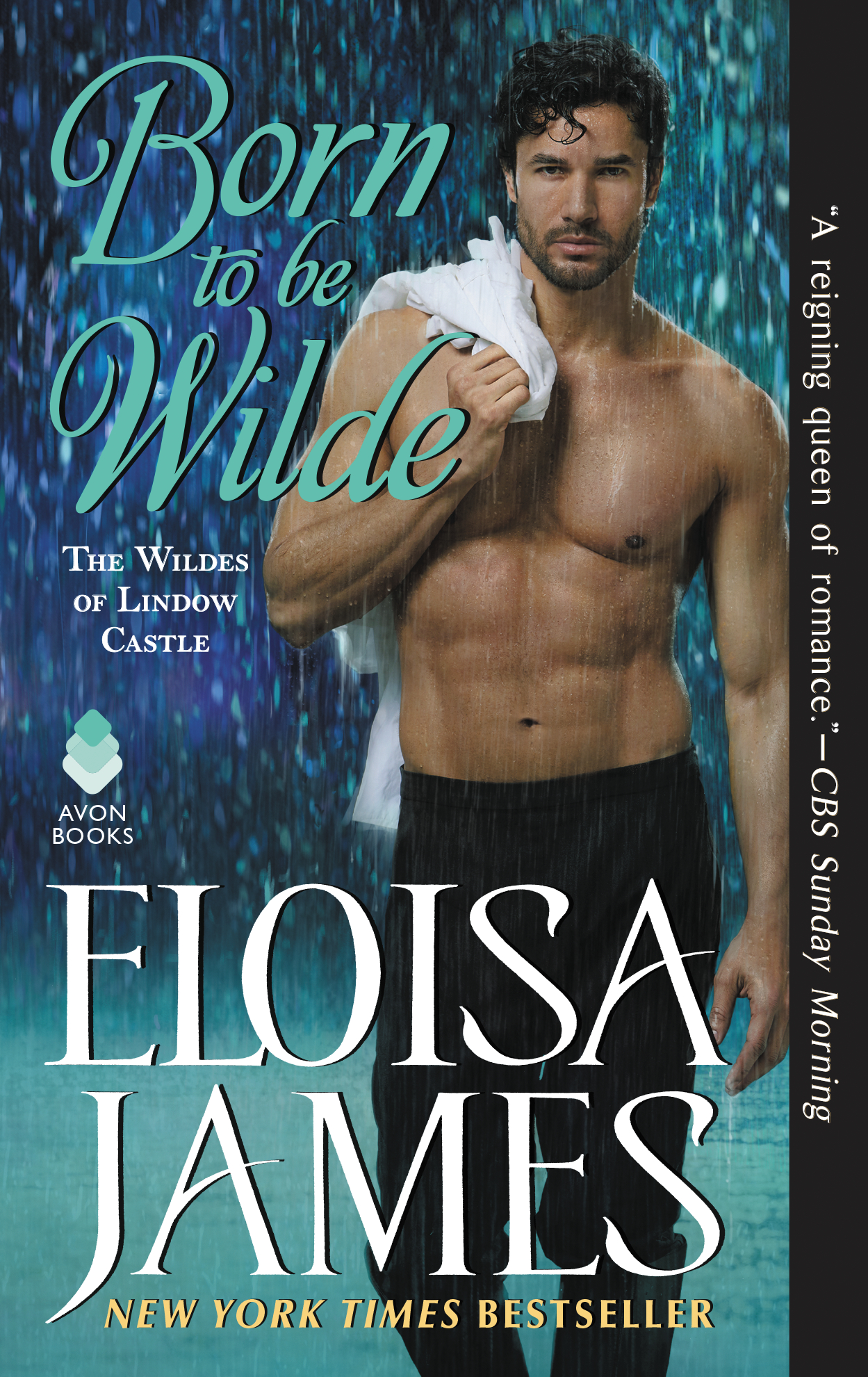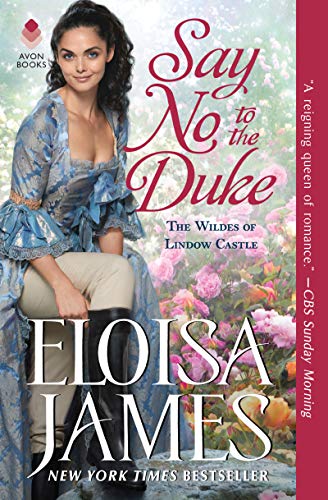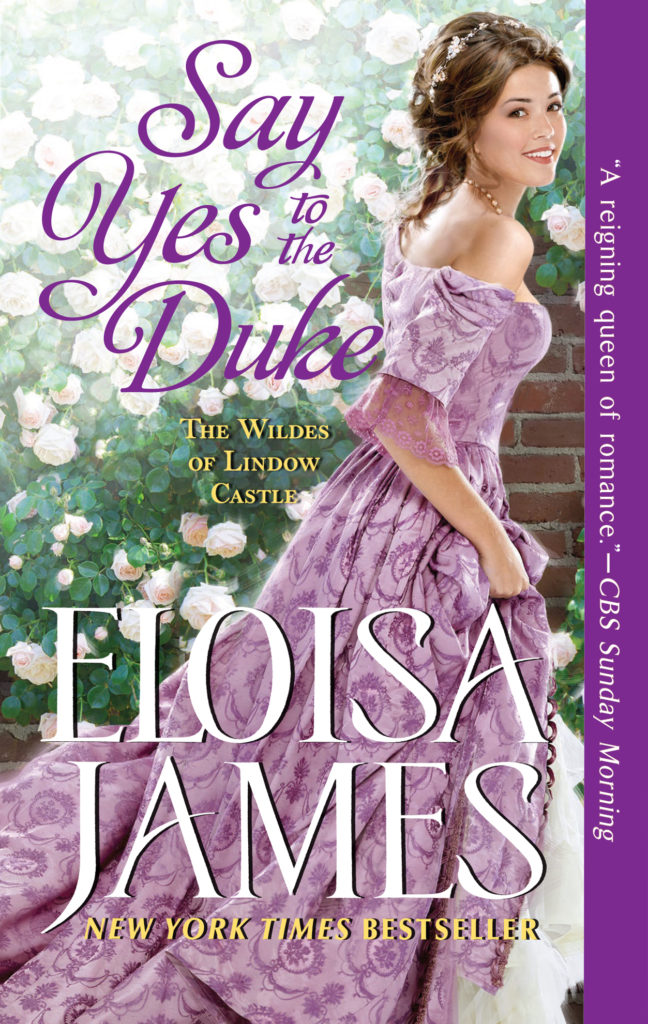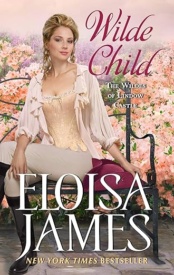My Last Duchess
Part of the Wildes of Lindow Castle Series
Every Duke needs a Duchess…
Hugo Wilde, the Duke of Lindow, has a drafty castle, eight naughty children—and no wife. Ophelia, Lady Astley, has a fine house, one well-behaved daughter—and no husband.
Hugo takes one look at Ophelia and loses his heart, but she doesn’t want more children or a castle. She takes one look at him and heads for her carriage.
Desperate to find a duchess, Hugo identifies an appropriate lady to woo. Yet when he meets Ophelia again, the duke realizes that he will marry her, or no one.
Now he faces the greatest challenge of his life.
He must convince Ophelia that their blazing sensuality, his exquisite castle, and his eight charming children add up to a match made in heaven.
When duke finds his duchess, can he win her heart?
A Wildes series prequel about the Wilde children’s parents, Hugo, Duke of Lindow, and Ophelia, Lady Astley.
Note: Eloisa has been serializing this story as Wilde Denial, an exclusive treat to readers who preorder her books. Her editor took one look and loved it so much that she asked for another 100 pages. So Wilde Denial has a new name, My Last Duchess, and has been published as a stand-alone book.

My Last Duchess
Book Extras

Eloisa Talks About the Frost Fair
Hear Eloisa explain the Frost Fair and reads from My Last Duchess.

The Wilde Family Tree
Learn who’s who in the Wilde Family.
Two Ophelia Paper Dolls
Eloisa chose these reader-submitted paper dolls for Ophelia, her heroine from My Last Duchess.

My Last Duchess
Reviews
"My Last Duchess is pure, frothy, Georgian-era historical escapism. Reading it felt like being wrapped up in a warm blanket while watching a picturesque snowfall outside."
"James proves once again why she is the romance genre’s primary purveyor of deftly written, delectably witty, and delightfully sexy love stories as she gifts readers with a prequel to her wildly popular The Wildes of Lindow Castle series"
— Booklist, John Charles
"The banter is witty, the secondary characters are exquisitely well drawn, and the glimpses of the children will cause readers who have read their stories to smile and entice those who have not."
"If you’re looking for a sweet, whirlwind of a romance, look no further! Not only do you get a wholesome helping of single parents trying to do right by their children, you also get to see those children pop up to give the story this lovely rosy glow."
My Last Duchess
Enjoy an Excerpt
Jump to Ordering Options ↓
Listen to an Audio Excerpt ↓
Chapter One
Lindow Castle
Cheshire
October 7, 1766
The Duke of Lindow dropped into a chair behind his library desk, feeling as if he’d taken a sharp blow to the gut. His hand tightened into a fist, crumpling the parchment he held, the record of an “Act to dissolve the marriage of Hugo, Duke of Lindow, with Lady Yvette Mordant, and to enable the said Duke to marry again.”
That would be his second marriage since he had lost his much-beloved wife Marie a decade ago. His ill-advised marriage to Yvette was over.
A pulse of anger went through him, and he shoved it away. Yvette had fled with her Prussian lover a year ago, leaving behind her four children—not to mention Marie’s three and his young ward, Parth—with all the concern of a cat abandoning a litter of kittens.
Hearing voices in the entry, he dropped the document in a drawer just as his twin sister, Lady Knowe, strode into the room. She was dressed for riding, wearing a cream-colored habit in the newest style: a huge collar, a great many buttons on her sky-blue waistcoat, and easily twice as many on the jacket. Her wide-brimmed hat was made of the same sky-blue silk, trimmed with white fur.
“Did it arrive?” She pulled off her hat and threw it a chair.
Hugo’s mouth quirked up. “Your wig, Louisa.”
“Bloody hell,” Louisa said crossly. She plucked up her hat and the attached wig, shook off a few pins, and plopped the wig back on top of her head, adjusting it in the glass that hung over the fireplace. “Don’t try to distract me. Prism says that you are brooding over the post, which can only mean one thing.”
There was no privacy in a castle, no matter how large.
“I’m a free man.”
His sister came over and gave him a whack on the back. “No rest for the weary, Hugo. You should be on the road to London before the end of the week. You need a new duchess—and those children of yours need a mother.”
“No.”
“What do you mean, no?” Louisa fell back, hand on her heart, looking as shocked as if he’d declared his intention to retreat to a monastery.
Marie’s death had torn a hole in Hugo’s chest. He hadn’t been able to summon more than mild affection for Yvette, and even that quickly withered in the face of her bottomless need for attention. She had turned to Count Yaraslov, a man distinguished only by his fatuous smirk and his handsome nose.
The last thing he wanted was another discontented woman in his household. “No,” he stated, managing to stop himself from growling it. “No, I am not taking another duchess.”
His sister shoved over a ledger and perched on his desk. “Feeling bruised?”
“Not particularly.”
“Yvette was a weak-headed ninny, and she’ll make the count’s life hell.”
Hugo had come to the same conclusion; he had been married to Yvette for six years, and fathered four children with her, and he still hadn’t understood her. Nothing seemed to please her: not him, the title, the castle, nothing.
Even so, she had wanted—she had deserved—more from him.
“She ran off with Yaraslov because I didn’t give a damn,” he said, meeting his sister’s eyes squarely.
Lady Knowe snorted. “Last time I heard, the church hadn’t started handing out dispensations for adultery on the basis of a husband’s lack of affection. Who could give a damn about Yvette? I can’t abide a woman who makes an art out of complaining.”
“Her children.”
“Now, there you’re wrong,” his sister said cheerfully, getting up from the desk. “The babes hardly knew what she looked like, and they’ve forgotten her entirely by now. The last time she visited Lindow Castle was two years ago at Yuletide. Did she spend any time in the nursery? No.”
“She was great with child,” Hugo pointed out.
“Other mothers manage to visit their children during confinement. She deposited the newborn with a wet nurse and climbed into a carriage two days later. About the only thing I can say for Yvette is that she has a constitution like an ox. Six children in four—”
“Four children in six years,” Hugo corrected.
His sister shrugged. “The nursery is so crowded that I lose track. To return to the important point, you have no need for more offspring, but you do need a mother for those you already have. If I include Parth in the number, since the boy is now an orphan, you have eight children.”
Hugo groaned.
“You’re like that old woman who lived in a shoe, except Lindow Castle is a mighty fine shoe. Luckily, you aren’t showing your age—or, should I say, our age—so you should be able to scoop up a new duchess without a problem,” his twin continued.
“No lady would want to marry a divorced man,” he pointed out, keeping it simple. He was not only divorced: he was jaded, cynical, and completely uninterested in the flimsy, foolish twaddle that passed for polite conversation.
“I’ll be damned if another wife of mine takes a lover,” he added. “I should have killed Yaraslov the moment I heard of it.” The sad truth was that he hadn’t cared enough.
“Pshaw, he wasn’t worth it,” Louisa said, with a dismissive wave of her hand. “Yvette was a lustful piece. The key is to find a woman with a disdain for the bed. Believe me, London is full of ladies in that frame of mind.”
Hugo groaned. “A lovely prospect for a spouse.”
“You have a fine figure,” Louisa said, surveying him from head to foot. “You’ll need to order a new suit, of course. That is pitifully out of date. Luckily, I have a length of rose silk that I can donate to the cause.”
“Rose silk,” Hugo said with disgust.
“Over-stitched with gold thread,” his sister said, nodding. “You’re disgustingly handsome, even given the Wilde eyebrows, so I’m not worried on that front. No, the real problem is persuading a skittish lady that eight children don’t pose an insurmountable burden. I’ll definitely have to sacrifice the rose silk; it might be enough to weight the scales of your desirability against your offspring.”
“No need for a sacrifice,” Hugo said, his tone sharpening. “I employ two nannies, three nursemaids, and a governess. That’s enough mothering. What’s more, given that Horatius is at Oxford, and Roland, Alaric, and Parth are at Eton, four of the eight would scorn the notion they needed mothering.”
His sister groaned. “Parth is more trouble than the other boys put together. Did I tell you about what he—” She cut herself off. “Never mind that. Ignoring those boys, and the two others, for the moment, you have daughters in the nursery. I’m serious, Hugo.”
He raised an eyebrow.
“The girls must be taken to London, presented at court, and brought out at parties. That’s not to mention the delicate business of steering them away from fortune-hunters and toward respectable young men.”
“You—”
She shook her head. “Your daughters cannot wither in Cheshire, going to the local assemblies, living on the edge of a bog, racketing around the castle with no one to talk to.”
That stung. “I visit the nursery at least once a day.”
“Your children are rarely in the nursery so that hardly matters.”
Hugo frowned. “They aren’t running around Lindow Moss, are they?”
“When they’re home, the older boys virtually live in the bog,” Louisa said dismissively. “What’s more, the children love to visit the stables, even the baby. My point is, terrible mother though she was, Yvette knew everyone in London.”
“As do I.”
“I have trouble picturing you rounding up your acquaintances and putting on a ball in Betsy’s honor—which will have to take place in a mere ten years or so. I don’t mind acting as your hostess here, but I rarely leave Cheshire, as you know. I go to London solely to visit the modistes and see an occasional play.”
“Perhaps Horatius will have married by then,” Hugo said, thinking of his oldest son. “I have every faith that he will choose a perfectly trained noblewoman, who can do the honors.”
“I can imagine,” Louisa said. She wrinkled her nose. “I’ll probably hate her.”
“You won’t have to see much of her. Horatius informed me last year that I was neglecting the future of England. He intends to attend every session in Parliament, so he’ll have to live in London a good part of the year.”
“I adore Horatius, but he’s a terrible prig,” Louisa said.
Hugo didn’t answer, because…it was true. Sad but true. His eldest son was best taken in small doses.
“At any rate, you can’t lean on the wife that your heir doesn’t yet have. Horatius is only eighteen. Perhaps he’ll rebel and turn into a complete rogue.”
They both considered it, and shook their heads at precisely the same moment, an unintended benefit of being twins.
“Enough,” Louisa stated. “You have to take a wife, and that’s all there is to it. The girls, particularly Joan, need a noblewoman of unassailable reputation to usher them into society.”
Hugo’s brows drew together, but before he could speak, his sister planted her fingers on his desk, leaning over and meeting his eyes. “Joan looks like Yvette; I’ll give her that. She’s going to be beautiful. But she does not look like a Wilde.”
“She is a Wilde,” Hugo growled, surging to his feet.
Louisa drew her shoulders back but held his gaze steadily. “Don’t play the fool, Hugo. Whether or not it’s true, her golden hair will be seen as a gift from Yaraslov. You need to marry a powerful woman now, so that rumors are throttled early, if only because those gossips are terrified of the Duchess of Lindow’s wrath.”
“Wonderful,” Hugo said, deadpan. “You’re telling me to marry a dragon with a disgust for bed sport. She’ll be a delight to live with.”
“You don’t have to bed her,” his sister pointed out. “Lord knows, you have more than enough heirs. Think of it as taking on a superior governess.”
“I don’t want another governess, no matter how superior.”
Louisa snorted. “I’ll let Prism know that you’ll be leaving for London tomorrow. Take the silk directly to Grippledon; I think he’s the best tailor these days.” She headed for the door, scooping up her hat on the way, but stopped and swung about. “Do not, under any circumstances, mention the children during your courtship, Hugo.”
“You just said that I need to find a woman precisely because of my offspring,” he said. “I should talk of nothing but the children—just as I would when choosing a governess, may I point out.”
“No,” his sister said. She rarely laid down decrees, preferring to run his household with smile, albeit a fierce smile. But this was a command. “Let the woman see you as a man, not a father. No one wants to marry a father.”
Hugo swore under his breath, and then shouted, “I’m not leaving until next week,” just as the door closed behind her.
end of excerpt
My Last Duchess
by Eloisa James
is available in the following formats:
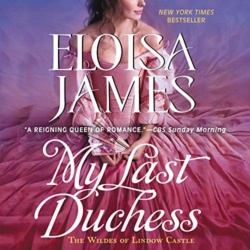
→ As an Amazon Associate I earn from qualifying purchases. I also may use affiliate links elsewhere in my site.


